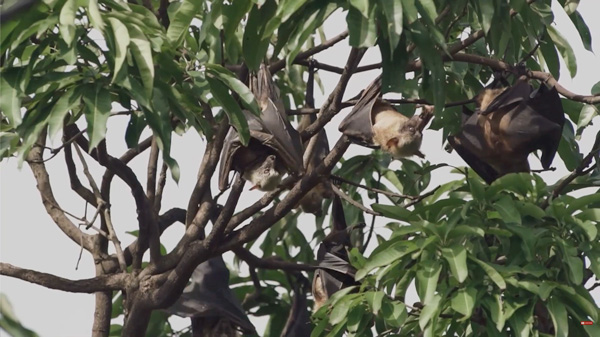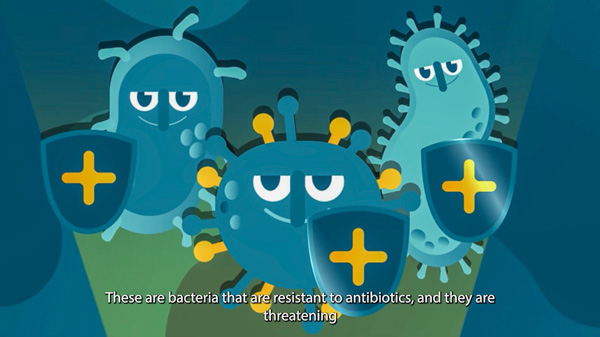At a glance
From 2005 to 2014, Indonesia faced severe challenges with H5N1 avian influenza, resulting in the highest global human fatalities and significant poultry losses, threatening farmers’ livelihoods. Zoonotic diseases like rabies, anthrax and leptospirosis continue to pose serious public health risks, underscoring the need for integrated efforts across human, animal and environmental health sectors to combat these threats.
Established in 2006, FAO ECTAD has worked closely with the Indonesian government to enhance the One Health system and improve outbreak response. Over nearly two decades, this collaboration has significantly reduced avian influenza cases and strengthened Indonesia's capacity to manage zoonotic diseases, antimicrobial resistance and transboundary animal diseases.
During the COVID-19 pandemic, FAO ECTAD was instrumental in boosting the capacity of health laboratories for rapid COVID-19 detection. As new threats like foot-and-mouth disease and African swine fever emerge, FAO ECTAD continues to support the government in addressing these challenges while focusing on climate change and food security.
With financial support from international partners including the Australian Government, Republic of Korea, the European Union, Pandemic Fund and other developed countries, FAO ECTAD remains dedicated to reducing pandemic risks and enhancing public health, nutrition and food safety. Through strategic collaborations, we're working towards a more resilient health security framework for Indonesia.
Highlights
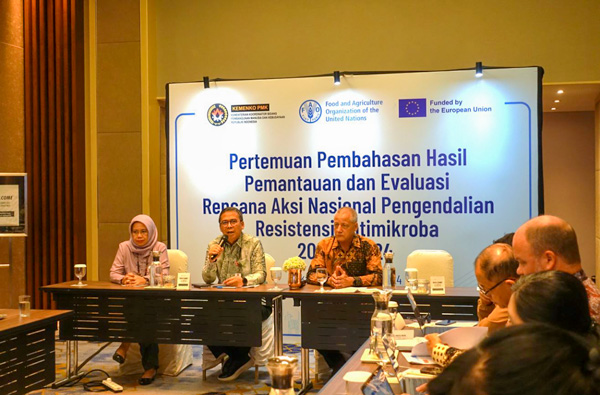
Indonesia reports progress in tackling antimicrobial resistance
An evaluation of Indonesia’s 2020–2024 AMR Action Plan shows positive strides in reducing antimicrobial resistance, especially in animal health. Backed by FAO and the EU, the review highlights improved coordination and policy enforcement, though challenges remain in the health sector.
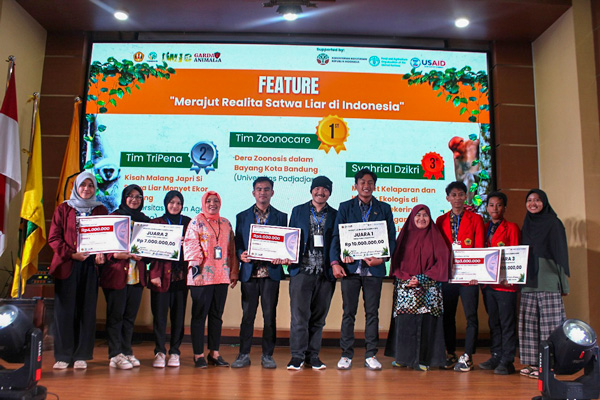
Youth journalism shines in Indonesia’s wildlife conservation effort
The 2024 Wildlife Journalism Competition celebrated young storytellers raising awareness on environmental health and conservation. Supported by FAO, USAID and Padjadjaran University, the event showcased the power of youth-led journalism in protecting Indonesia’s biodiversity.
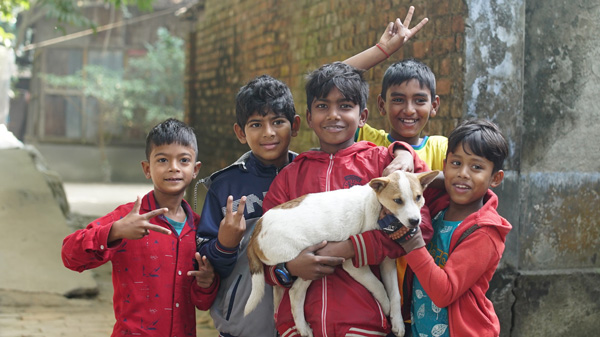
Indonesian expertise gives Bangladesh rabies eradication a boost
Through South-South cooperation, Bangladesh is advancing its rabies eradication efforts by training national teams in dog catching and vaccination—skills crucial for reaching roaming dogs. With support from FAO and Indonesia’s renowned “Bali A-Team,” the initiative highlights the power of capacity building in tackling this preventable disease.
Publications
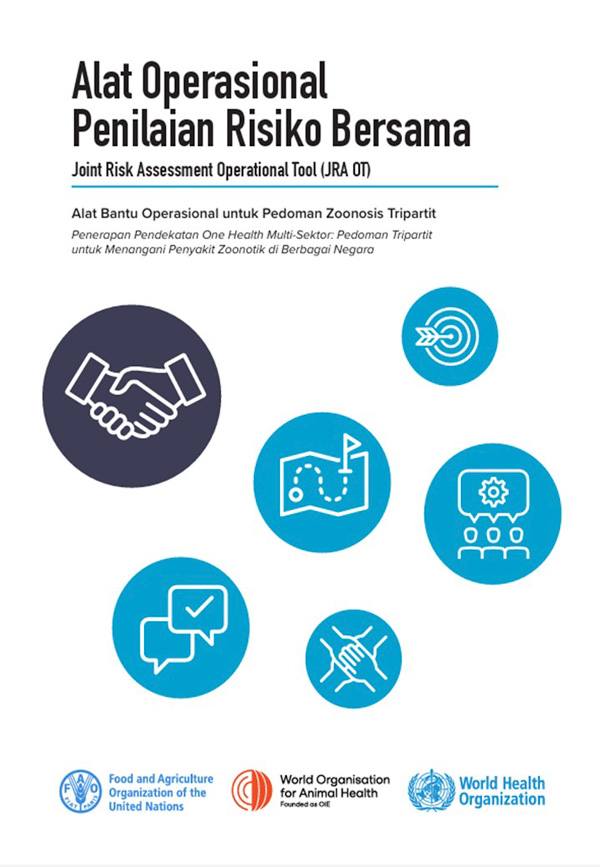
Publications
Alat Operasional Penilaian Risiko Bersama: Alat Bantu Operasional untuk Pedoman Zoonosis Tripartit
Zoonotic diseases like avian influenza pose serious health risks. Effective management requires cross-sector coordination. The Joint Risk Assessment Operational Tool (JRA OT) assists national ministries with qualitative risk assessments, offering guidance and adaptable templates for various professionals. It is suitable for countries regardless of prior experience and can address other One Health threats, such as antimicrobial resistance.
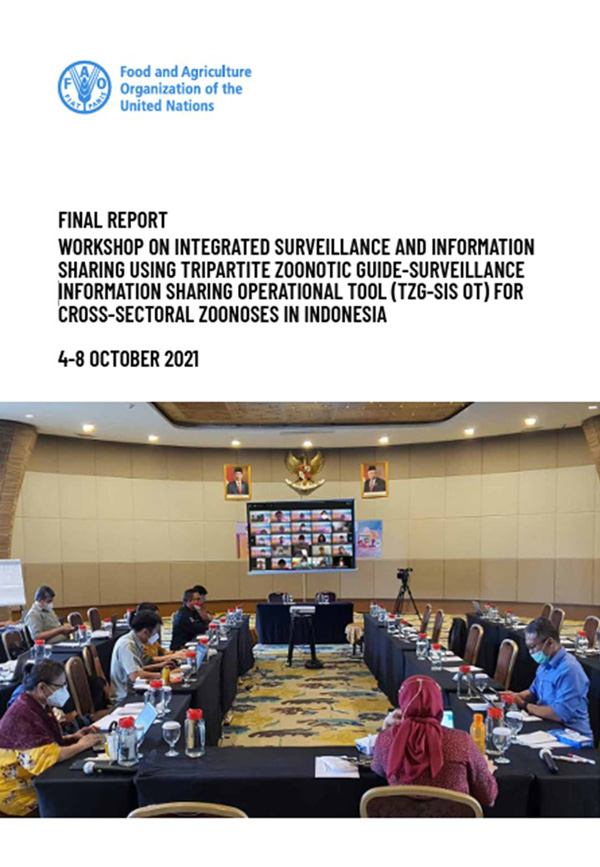
Publications
Final Report: Workshop on Integrated Surveillance and Information Sharing Using the TZG-SIS OT for Zoonotic Diseases in Indonesia
The Tripartite Zoonotic Guide - Surveillance and Information Sharing Operational Tool (TZG-SIS OT) aids Indonesia in evaluating its cross-sectoral surveillance for zoonotic diseases through a One Health approach. In a workshop from 5–7 October 2021, participants developed a roadmap to strengthen national systems, outlining key activities and required resources. SIS OT recommendations will be implemented in three phases, led by designated ministries, with some initiatives already underway.
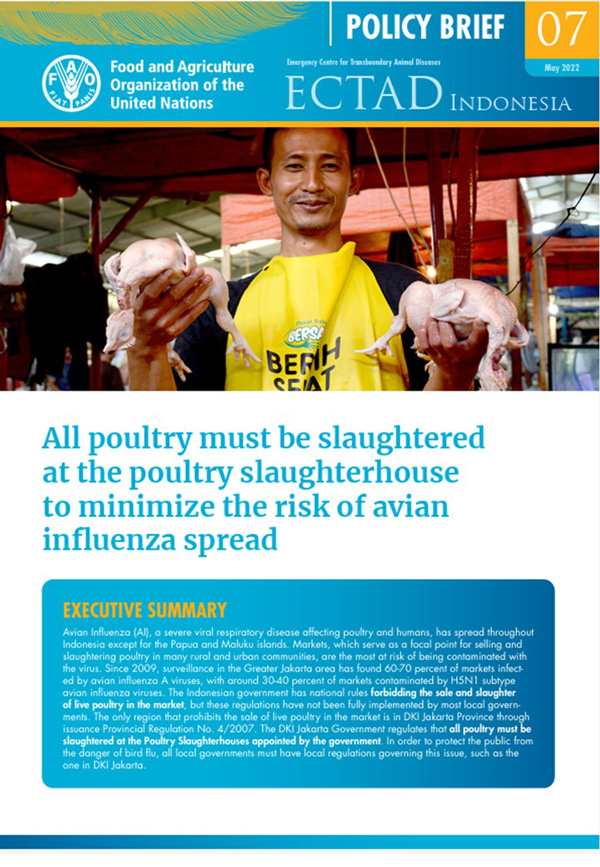
Publications
Policy Brief: All poultry must be slaughtered at the poultry slaughterhouse to minimize the risk of avian influenza spread
Avian influenza (AI), a severe viral respiratory disease affecting both poultry and humans, has spread throughout Indonesia except in the islands of Papua and Maluku. Markets where poultry are slaughtered and sold are also where poultry are at risk of being contaminated with the virus.
Videos
Results snapshots from 2014 to 2023
Trained beneficiaries
Technical documents and information resources published
One Health multisectoral coordination mechanisms established
Animal health laboratories capacity improved
Rapid Response Team and Technical Working Group on Zoonoses and EIDs established
More details
- More than 8 500 trained beneficiaries from 2014 to 2023 in disease prevention, detection and response.
- More than 120 technical documents and information resources have been published, including guidelines, standard protocols, manuals, training materials and research papers. These have provided critical insights for decision-making and strengthened Indonesia’s animal health system.
- Multisectoral coordination mechanisms for One Health have been established to reinforce the institutionalization of this approach.
- Eleven national and ten subnational animal health laboratories have sufficient capacity for conducting surveillance, detection, and diagnostic testing for zoonotic diseases and emerging infectious diseases.
- Five Rapid Response Teams and Technical Working Groups on Zoonoses and Emerging Infectious Diseases were established at subnational levels.
Sustainable Development Goals contributions









Key facts
ECTAD Programme has managed over 57 projects since 2006.
- Indonesia is a hotspot for emerging infectious and zoonotic diseases due to its biodiversity, population density and geographic location.
- Significant poultry industry concentrated in Java; agriculture, forestry and fishing contribute 12.53 percent to GDP.
- 40.8 million people employed in agriculture and related sectors.
- Six prioritized zoonoses: avian and swine influenza, COVID-19, MERS-CoV, rabies, anthrax, zoonotic tuberculosis and leptospirosis.
- One Health approach adopted for zoonoses prevention and pandemic preparedness, promoting collaboration across public health, veterinary and environmental sectors.
- Indonesia led One Health initiatives in ASEAN and advocated for its integration among G20 countries during the 2022 G20 Presidency.
Our partners
- Government of Indonesia
- Coordinating Ministry of Human Development and Cultural Affairs
- Coordinating Ministry of Food
- Coordinating Ministry of Community Empowerment
- Ministry of Agriculture
- Ministry of Forestry
- Ministry of Environment
- Ministry of Health
- Ministry of Home Affairs
- National Development Planning Agency (Bappenas)
- National Research and Innovation Agency (BRIN)
- National Disaster Management Agency (BNPB)
- Subnational Governments
- Academia
- Associations
- Australian Government’s Department of Foreign Affairs and Trade
- Communities
- European Union
- Private sectors
- Republic of Korea’s Ministry of Agriculture, Food and Rural Affairs
- The World Bank
- World Health Organization
Related links
Contact
Ms Farida Zenal
Country National Veterinary Advisor, Team Leader ad interim
FAO ECTAD
Ministry of Agriculture of the Republic of Indonesia
Office Building C, 6th Floor
Jl. Harsono RM Kav. 3, Ragunan,
Jakarta Selatan, 12550 INDONESIA

